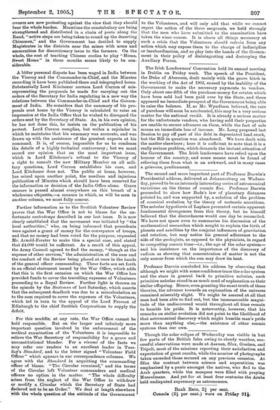A bitter personal dispute has been waged in India between
the Viceroy and the Commander-in-Chief, and the Minutes recording it have been published there and telegraphed home. Substantially Lord Kitchener accuses Lord Curzon of mis- representing the proposals he made for carrying out the orders of the Secretary for India regulating in a new way the relations between the Commander-in-Chief and the Govern- ment of India. He considers that the summary of his pro- posals sent home by the Viceroy is calculated to raise an impression at the India Office that he wished to disregard the orders sent by the Secretary of State. As, in his own opinion, be has not done this, he insists on the publication of his protest. Lord Curzon complies, but writes a rejoinder in which he maintains that his summary was accurate, and was 'drawn up with the assistance of the greatest experts at his command. It is, of course, impossible for us to condense the details of a highly technical controversy ; but we must record our opinion that on the most important issue, Which is Lord Kitchener's refusal to the Viceroy of a right to consult the new Military Member on all mili- tary questions, Lord Curzon establishes his case, and Lord Kitchener does not. The public at home, however, has seized upon another point, the needless and injurious publication of Minutes which should have been reserved for the information or decision of the India Office alone. Grave censure is passed almost everywhere on this breach of a Wholesome etiquette,—a censure in which, as will be seen in another column, we most fully concur.


































 Previous page
Previous page